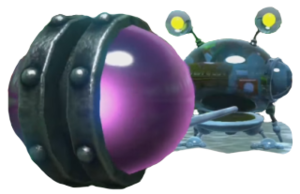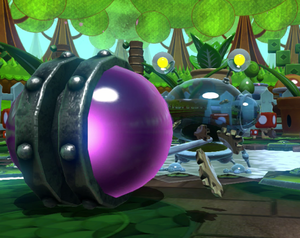Translucent Wollywog: Difference between revisions
(→See also: Category didn't really apply; no other wollywog had this category anyway) Tag: Mobile edit |
m (Text replacement - " " to " ") |
||
| Line 15: | Line 15: | ||
*[[Yellow Wollywog]] | *[[Yellow Wollywog]] | ||
*[[Amphituber family]] | *[[Amphituber family]] | ||
[[Category:Bosses]] | [[Category:Bosses]] | ||
[[Category:Pikmin Adventure enemies]] | [[Category:Pikmin Adventure enemies]] | ||
[[Category:Amphituber family]] | [[Category:Amphituber family]] | ||
Revision as of 12:49, September 13, 2020
The Translucent Wollywog (Translucent Wollyhop in the European version) is the second boss to be fought in the extra challenges of Pikmin Adventure. It is almost the same exact boss as the Large-Mouth Wollywog from the 16 standard challenges. The only differences between the two are that the Translucent Wollywog is see-through compared to the Large-Mouth Wollywog which is yellow, and that it shoots its tongue out three times in a row instead of just one time.
Strategy
The strategy used for the Large-Mouth Wollywog also applies here. When it shoots out its tongue, attack it while it is still out, and it will hit itself in the head and be dazed for a bit. Use this interval of time to attack the weak point on its tongue, which should break in no time. Once it breaks, the Translucent Wollywog will move back into the center of the pond. Its cheeks are now open as weak points, proceed to throw Pikmin at them, dodging any tongue attacks. After the player breaks both cheeks, its back becomes the final weak point. At this time, it is best to locate a rock, and throw it at the Translucent Wollywog. Chances are that it will be stunned for a decent amount of time, so get behind the Wollywog and throw Pikmin at its back until it breaks, finishing the fight.
Trivia
- Interestingly, the Translucent Wollywog is classified under the "Wollywog family", not the Amphituber family. This is assumed to be a mistake (this is corrected in the European version).

